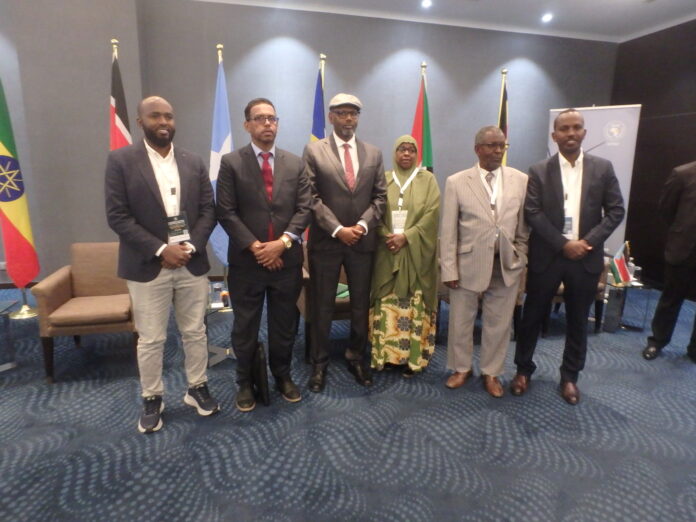By Henry Owino
Nairobi, Kenya: In Northern and Eastern Africa, agricultural activities have been hindered by regular invasions of desert locusts and other transboundary pests. Climate change has aggravated this situation by creating ideal breeding conditions for these ancient and dangerous migratory pests.
The transboundary nature of these pests poses a significant challenge for farmers in the region. As the pests disregard national borders, a unified regional response is crucial. Climate change effects, such as El Niño rains, create favorable conditions for pest propagation, further complicating the situation.
Erratic weather patterns, another consequence of climate change, exacerbate the difficulties faced by agricultural communities. These changes make it increasingly challenging for farmers to plan and safeguard their livelihoods. This leads to crop failures, food shortages, and displacement.

Again, frequent invasion of pests does pose significant challenges in the region thus threatening food security and the well-being of the most vulnerable communities. Among the persistent threats of transboundary pests include; Desert Locusts, Quelea Birds, Fall Army worms, and African Army worms stand out.
These Remarks were made by Dr. Workneh Gebeyehu, The Intergovernmental on Authority and Development (IGAD)Executive Secretary at the Ministerial Meeting of the Inter-Regional Platform for Sustainable Management of Desert Locusts and other Transboundary Pests led by IGAD.
IGAD representatives were flanked by World Bank, Desert Locust Control Organization-East Africa (DLCO-EA), Ministers, Member States, Lead MDAs, Experts in Agriculture and Pest Management, among other partners hosted by Kenya’s Ministry of Agriculture and Livestock Development in the country’s capital, Nairobi.
The IGAD region comprises the countries of Djibouti, Eritrea, Ethiopia, Kenya, Somalia, South Sudan, Sudan and Uganda which were severely attacked by desert locusts between 2019-2021. However, through IGAD interventions, the outbreak has been minimal in subsequent years.

Despite favorable ecological and weather conditions during the rainy season of October, November, and December 2023, the region successfully avoided another desert locust outbreak similar to or worse than the one experienced in 2019/2020.
The achievement highlights the crucial role of the IGAD Platform in coordinating early warning and early actions, resulting in significant cost savings and reduced use of synthetic pesticides, thereby minimizing negative environmental impacts.
The desert locust is a species of locust, a periodically swarming, short-horned grasshopper in the family Acrididae. They are found primarily in the deserts and dry areas of northern and eastern Africa.
Historical Context and Regional Response
“We have witnessed the catastrophic impact of these challenges firsthand. The unprecedented rainfall in 2019, triggered by El Niño, resulted in one of the most severe desert locust outbreaks in recent history, destroying vast tracts of our agricultural land. This crisis was a stark reminder of the imperative for a unified regional strategy,” Dr. Gebeyehu recalled.
Dr. Gebeyehu however, stated in response, during the 34th Extraordinary Summit of the IGAD Heads of State and Government in February 2020, delegates were tasked with leading efforts to combat the Desert Locust invasion. With the support of the World Bank’s Emergency Locust Response Program, delegates established the Inter-Regional Platform for Sustainable Management of Desert Locusts and other Transboundary Pests in 2021.
Jonathan Mueke, Principal Secretary, Ministry of Livestock and Development on behalf of Kenya Cabinet Secretary for Agriculture, said the transboundary nature of the pests require a united regional response. He emphasized it is essential for member states to coordinate their efforts to efficiently monitor, control, and mitigate pests’ impact.
“Our agenda is robust, aiming to promote collaboration among member states by aligning policies, enhancing our understanding of the dynamic challenges posed by these pests in the context of climate change, and strengthening our capacity to implement bio pesticide- based pest management strategies,” Mueke explained.
The Ministry pointed out that recurrent outbreaks of the pests, particularly the desert locusts, pose severe threats to agriculture across the region, worsening food insecurity and economic instability.
“Our commitment to regional cooperation and agricultural sustainability is vital. Let us reaffirm our dedication to overcoming these challenges and ensuring food security for all,” the statement read.
The IGAD platform has since facilitated collaboration among member states and neighboring countries to effectively manage transboundary pests.
Collaborative Efforts
The meeting aimed to strengthen and expand the collaborative efforts, improve regional advocacy, strategic decision-making, coordinated assessments, contingency planning, capacity building, and information exchange towards early warning signs to mitigate possible invasion.
The meeting adopted a Ministerial Communique, outlining collective commitments and strategic actions. Renewed pledge from all member states to support the platform’s objectives and uphold shared responsibilities.
They adopted harmonized policies and regulations to strengthen preventive measures, preparedness, and response mechanisms. Increased knowledge exchange and capacity development, particularly in the use of bio-pesticides.
Integrating climate change considerations into pest management strategies. Strengthened cooperation and joint initiatives to enhance collective capacity. A deeper understanding of the evolving threats posed by transboundary pests.
A structured roadmap guiding IGAD collective efforts to achieve the outlined objectives. Greater adoption of biopesticide-based pest management strategies among plant protection experts and officers from member states.
The discussions were crucial in shaping the region’s resilient and sustainable future. By working together, sharing resources, and implementing joint initiatives, member states can overcome the challenges posed by transboundary pests and climate change.
Members agreed that with their expertise, dedication, and collaboration, effective strategies to protect regional agricultural livelihoods and ensure food security for all communities is possible.
The leadership and partners assured IGAD of unwavering commitment to their shared mission, moving forward with determination and unity to make a significant difference in the region.














